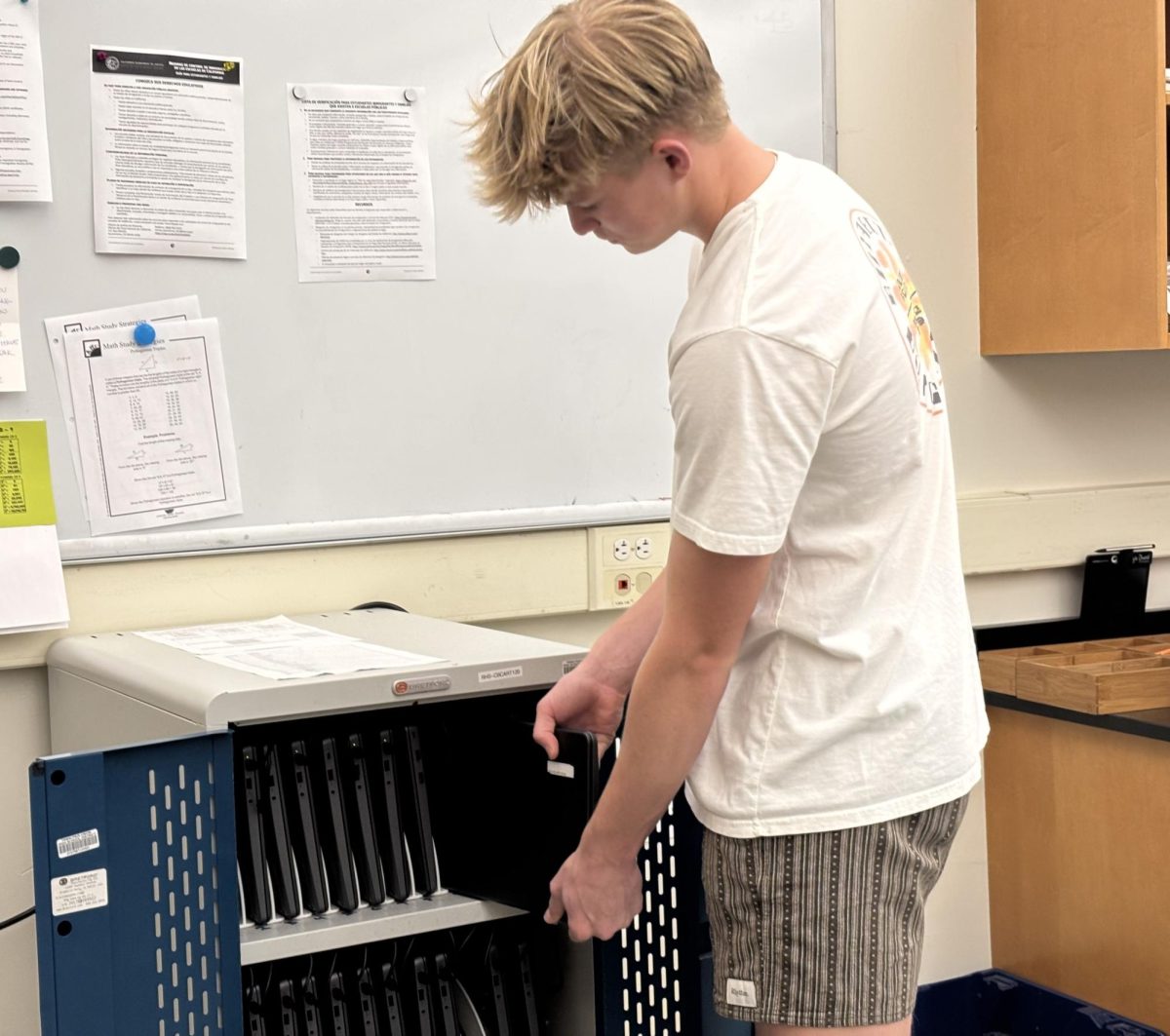
Parents of Tamalpais Union High School District (TUHSD) students came to the Redwood library on the morning of Oct. 18 to discuss a potential new phone ban with Yondr phone pouches. The monthly Parent Chat with Principal Payne covers pressing issues intending to gain parents’ perspectives, with this month’s meeting focusing on the role of phones in the modern classroom. Seeking community input before deciding on the phone policy, the school board will officially vote on Nov. 16, 2024 to implement a mandate of the Yondr pouches, which are set to be used starting January 2025 if the mandate passes.
Assistant Superintendent Corbett Elsen co-led the discussion with school board trustee Kevin Saavedra. Both leaders responded to parents’ concerns regarding the Yondr pouches, aiming to create an open space for parents to share their views on the policy. The school board plans to decide on a new phone policy with high parental approval, the reason behind gathering community members at this month’s Parent Chat.
“It’s great to get input, talk directly, answer questions [as well as] hear different pros and cons, perspectives and experiences because that’s the way we find the best solution,” Elsen said. “There’s no perfect solution [to phone use], but we’re trying to collectively find a better solution.”
Standing in for Superintendent Dr. Tara Taupier, Elsen oversaw this meeting in hopes of making local parents part of the phone ban implementation decision-making process. Parent Teacher Student Association president Crista Morrow was one of the Redwood parents who attended Friday’s meeting. Morrow feels that Yondr has many faults, but is a step forward in addressing how regulated phone use would create healthier learning environments.

“I don’t have concerns about the cost of a new phone policy because I think money spent on this is absolutely worth it. I love the idea of [Redwood students] not having their phones during passing periods so that [students] can have more organic social interactions, but I’m not sold on Yondr,” Morrow said.
While the board is adamant about making a community-run decision, Friday morning’s discussion focused mainly on the parent perspective. The meeting began at 9:15 a.m.

on a Friday, meaning that students could only listen in on the discussion if they had no first period and came into the library to study, which is exactly what junior Rhett Krawitt did.
Having invited his dad to the meeting in hopes of providing a counterargument to oppose the Yondr pouch policy, Krawitt overheard parents interject in the conversation to spotlight their perspectives.
“[The environment of the room] felt pretty divided; there was a group of parents that were very against not necessarily the idea of a restrictive cell phone policy, but sort of the way [board members] were going about it and the way that it was going to be implemented,” Krawitt said. “Then, there was the group that was involving the board members and some of the other parents, who were in favor of restrictive phone policies, and sort of the Yondr pouches.”
With the conflicting ideas in the room, Elsen tried to steer the conversation to the central topic: phones aren’t healthy in the school environment.
“The scientific research is becoming crystal clear; [phone usage] has a negative impact on adolescent brain development and socialization — mental health — [and] given that we know that, [we need to] find appropriate uses of phones, which there absolutely are, and find ways to mitigate and prevent negative implications [of phone use],” Elsen said.
Elsen declined to comment on his opinions on the phone policy, noting that he doesn’t want to “cloud” the community’s opinion. While he doesn’t want to share his thoughts, Elsen shared his plans for his children’s phon

e use, spotlighting some of the motivations behind the proposed phone ban.
“I am very concerned about exposure to [phone use]. I’ve already told my girls that they will be [some] of the last kids to get a smartphone,” Elsen said. “[I told them to] be ready for that because I, personally, am very much concerned about the impact of [phones], especially for the middle-aged high school students.”

Elsen’s anecdotal tie to the issue is an important perspective in the Yondr pouch discussion. While phones have begun to carry a stigma in the parent population, students seem to develop their argument against the Yondr pouches, noting that the in-classroom distraction of phone use is already combatted by the current policy of the phone caddy, which holds phones in an accessible yet isolated manner during all instructional periods.
“We currently have a cell phone policy that fulfills the state’s requirements, and cell phones are away during classes — teachers take phones during classes — so [my dad] was asking [at the meeting] why we need to have a stricter policy… if our current policy is working,” Krawitt said. “[Plus,] our current policy doesn’t cost $100,000.”

In addition to the $137,000 cost of implementing the Yondr legislation at TUHSD, Krawitt feels that the Yondr pouches are unnecessary, as students aren’t routinely distracted by their phones during class.
“The whole point [of the Yondr pouches] is to keep people off of their phones during the school day, but if you think about people going on social media, the majority of the time that [students] are spending on social media is at home, and so that mental health side of [phone use] is going to [arise] at home if [it’s] taken away at school,” Krawitt said. “If you take cell phones away during school, people can’t find their friends – people lose that communication with other friends outside of this school – [which] creates a worse social atmosphere by taking phones during breaks and lunches [in addition to instructional time],” Krawitt said.
In addition to the social health impact of Yondr pouches, Krawitt believes the money can be used to address the student body’s more pressing needs. While discussions are still underway to decide the optimal course of action for student phone use, there are a vast range of perspectives on the potential new policy.

At this month’s Parent Chat, the community seems to be at odds with the role of phones in the modern school atmosphere, making the decision unclear at this point.









